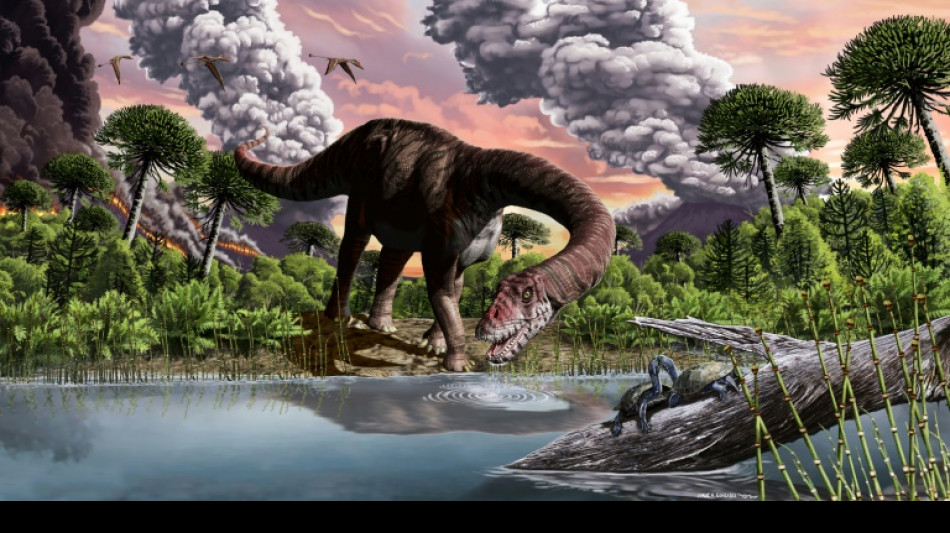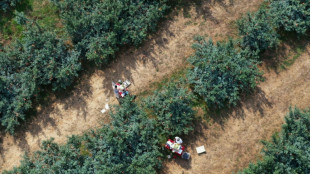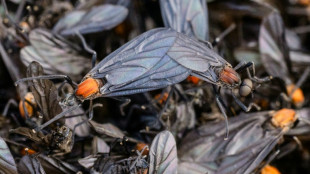
-
 'Hothead' Fognini announces retirement from tennis
'Hothead' Fognini announces retirement from tennis
-
Werner unveiled as first new Leipzig coach in Klopp era

-
 Zelensky talks peace with pope ahead of Ukraine recovery conference
Zelensky talks peace with pope ahead of Ukraine recovery conference
-
Musk's chatbot Grok slammed for praising Hitler, dishing insults

-
 Another Lions injury worry after fullback Kinghorn limps off
Another Lions injury worry after fullback Kinghorn limps off
-
Rider quits Tour de France after cycling 174km with fractured shoulder

-
 Top European rights court finds Russia committed abuses in Ukraine
Top European rights court finds Russia committed abuses in Ukraine
-
Inspired Queensland upset NSW to snatch State of Origin crown

-
 Lions tame gutsy Brumbies for fourth straight win on Australia tour
Lions tame gutsy Brumbies for fourth straight win on Australia tour
-
Red Bull sack F1 team chief Horner

-
 Demna bows out at Balenciaga with star-studded Paris catwalk show
Demna bows out at Balenciaga with star-studded Paris catwalk show
-
Lions tame gutsy Brumbies to make it four straight wins

-
 Djokovic eyes Wimbledon history, wounded Sinner in spotlight
Djokovic eyes Wimbledon history, wounded Sinner in spotlight
-
European stocks brush off Trump's copper, pharma tariff threats

-
 France police raid far-right party offices over campaign financing
France police raid far-right party offices over campaign financing
-
Commerzbank commits to strategy as UniCredit ups direct stake

-
 Deadly temperatures blasted western Europe in record hot June
Deadly temperatures blasted western Europe in record hot June
-
Volkswagen US deliveries fall as Trump tariffs bite

-
 England recall Archer after injury exile for third Test against India
England recall Archer after injury exile for third Test against India
-
Red Bull sack team chief Horner after two decades in charge

-
 Macron turns to politics on second day of UK state visit
Macron turns to politics on second day of UK state visit
-
Ukraine says Russia launched largest drone, missile attack of war

-
 Red Bull sack team chief Horner afer two decades in charge
Red Bull sack team chief Horner afer two decades in charge
-
Toll of Air India disaster rests at 260 as focus turns to crash report

-
 Iraq's Kurdistan enjoys all-day state electricity
Iraq's Kurdistan enjoys all-day state electricity
-
Israel, Hamas defiant as US presses for ceasefire

-
 Lidl owes French rival $50 mn after ads ruled deceptive
Lidl owes French rival $50 mn after ads ruled deceptive
-
Spain PM announces anti-graft plan as scandal rocks govt

-
 Marseille wildfire that closed airport 'receding'
Marseille wildfire that closed airport 'receding'
-
Demna to bow out at Balenciaga with farewell Paris fashion show

-
 Markets mixed as Trump flags fresh tariffs, eyes on trade talks
Markets mixed as Trump flags fresh tariffs, eyes on trade talks
-
Mattel launches Barbie doll with diabetes

-
 Cricket's Indian Premier League value surges to $18.5 bn: report
Cricket's Indian Premier League value surges to $18.5 bn: report
-
Dutch art sleuth recovers stolen trove of UNESCO-listed documents

-
 Japan imperial couple visit WWII memorial, hail 'deep friendship' in Mongolia
Japan imperial couple visit WWII memorial, hail 'deep friendship' in Mongolia
-
Exiled Chinese lawyers grieve loss of civil society decade after crackdown

-
 Netanyahu says reaffirmed hostages release, Hamas defeat in Trump talks
Netanyahu says reaffirmed hostages release, Hamas defeat in Trump talks
-
The long slow death of Norway's wild salmon

-
 Climate change made European heatwave up to 4C hotter: study
Climate change made European heatwave up to 4C hotter: study
-
Can Kenya attract the outsourcing jobs of the AI future?

-
 Taiwan kicks off military drills in face of China threat
Taiwan kicks off military drills in face of China threat
-
China's snaps 4-month consumer decline but factory price deflation deepens

-
 China's 'new farmers' learn to livestream in rural revitalisation
China's 'new farmers' learn to livestream in rural revitalisation
-
Asian markets mixed as Trump flags fresh tariffs, eyes on trade talks

-
 Rotten insects, viral videos and climate change: S.Korea battles 'lovebug' invasion
Rotten insects, viral videos and climate change: S.Korea battles 'lovebug' invasion
-
Bitter pill: Cuba runs low on life-saving medicines

-
 Owen Farrell in line for Lions tour debut against AUNZ XV: reports
Owen Farrell in line for Lions tour debut against AUNZ XV: reports
-
India look to maintain momentum against faltering England in third Test

-
 June was hottest on record in western Europe: EU monitor
June was hottest on record in western Europe: EU monitor
-
Luis Enrique ready for 'special' showdown between PSG and Real Madrid


Faeces, vomit offer clues to how dinosaurs rose to rule Earth
Faeces, vomit and fossilised food from inside stomachs have provided new clues into how dinosaurs rose to dominate Earth, a new study revealed on Wednesday.
Scientists have discovered plenty about dinosaurs -- particularly about how they vanished off the face of the planet 66 millions years ago.
But "we know very little about their rise," Martin Qvarnstrom, a researcher at Sweden's Uppsala University and the study's lead author, told AFP.
Dinosaurs first appeared at least 230 million years ago, fossils have shown.
But they would not become the world's dominant animal until the start of the Jurassic Period some 30 million years later.
What caused this ascension -- and why it took so long -- have long been a subject of fevered debate between scientists.
For the new study in Nature, a European team exhaustively probed more than 500 "bromalites" -- the fossilised remains of dinosaur faeces, vomit and undigested food inside intestines -- from sites in Poland.
"By linking the bromalites to the producers and identifying what's in them, we can start connecting who ate whom or who ate what," Qvarnstrom explained.
The researchers used new technology such as synchrotron microtomography to build a 3D image of the samples.
This revealed that the excrement contained the remains of insects, plants, fish and bigger animals.
The researchers compared this with data about fossils, plants and the climate to construct a model for the step-by-step rise of the dinosaurs.
- 'Opportunistic animal' -
This ascension was illustrated by the bromalites themselves, which tripled in average length and width over the 30 million-year period.
This demonstrated how the animals that digested, vomited or excreted these remains tripled in size over that time.
Some of the fossilised remains belonged to an early ancestor of dinosaurs, the Silesaurus.
Far from the mighty T-Rex, the "pretty small" Silesaurus weighed around 15 kilograms at most, Qvarnstrom said.
The dominant animal at the time were barrel-chested herbivorous reptiles called Dicynodonts, which weighed a few tons.
But Silesaurus had a big advantage over its stocky rival -- it was omnivorous.
"What we see from its droppings is that it was eating a lot of insects, fish and plants," Qvarnstrom said.
This meant the "opportunistic animal" was better at adapting to sudden changes in the environment.
For example, a massively rainy period called the Carnian Pluvial Episode lead to the evolution of many new plants.
The big herbivorous reptiles struggled to adapt to this new diet.
But the Silesaurus -- and later long-necked dinosaurs that were ancestors of the Diplodocus -- "were able to just feast on all these new plants", Qvarnstrom said.
As the smaller dinosaurs grew bigger from this new grub, so did larger carnivores that fed on them.
By the time the Jurassic period rolled around, the landscape was dominated by giant plant-eating dinosaurs and ferocious carnivores.
- Two competing theories -
The study will not settle the debate about what led to the rule of dinosaurs once and for all.
There are two main theories for their rise. One is that early dinosaurs used key physiological advantages -- such as standing upright -- to outcompete their rivals.
The other is that environmental upheaval, such as volcanic eruptions or a changing climate, killed off many of the previously dominant animals, creating an opening at the top.
The researchers behind the bromalites study suggested it was a combination of the two theories, in which the dinosaurs used their evolutionary advantages to capitalise on environmental changes that had knocked back their rivals.
Lawrence Tanner, a researcher at Le Moyne College in New York, said the study "should be seen as a starting point for further work".
Although its methodology is "particularly creative", the study is "limited in its context and scope", Tanner commented in an attached Nature paper.
The research only covers the Polish Basin region, which at the time was part of the north of the Pangea supercontinent, he observed.
Qvarnstrom agreed, saying that he thought it would be "really cool" to use the model the team developed on other regions -- such as the south of Pangea, where the first dinosaurs appeared.
L.Harper--AMWN
